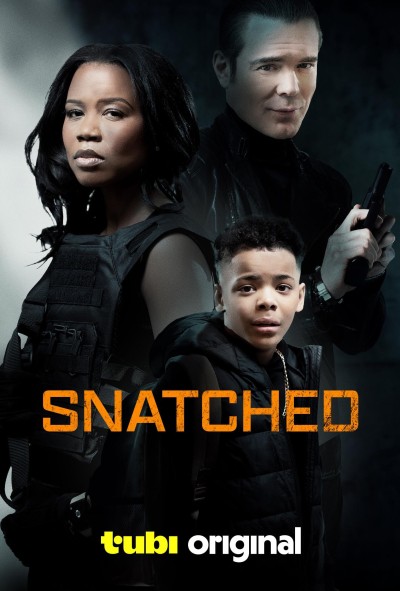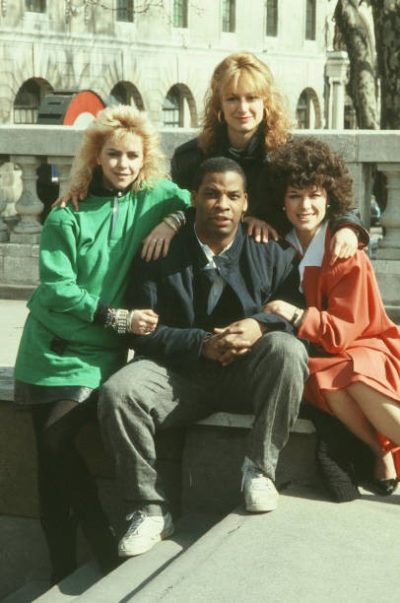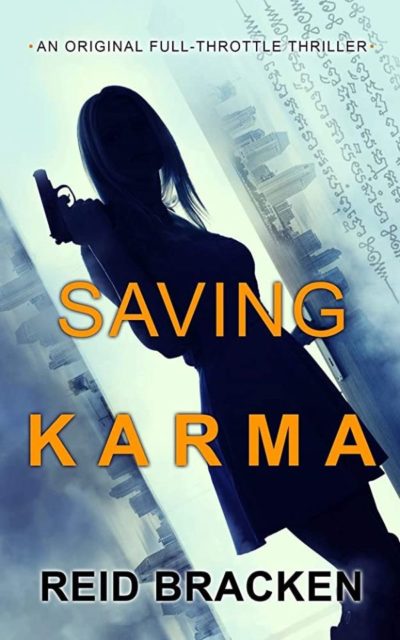 Bruns and Olson are retired U.S. Navy officers, Olson in particular with a background in naval intelligence –and that background is drawn on heavily in the various self-published series that he and Bruns co-write. This particular 117-page novella exists only in an electronic edition; in keeping with my usual practice, I’d never have read it, but for the fact that it’s a freebie. Supposedly, it’s the fourth in a succession of “Standalone Suspenseful Short Reads.” In fact, although I read it as a standalone, it actually ties directly into The Pandora Deception, the fourth novel in the authors’ WMD Files series. (The first novel of that series is premised on the conceit that former Iraqi dictator Saddam Hussein really did have his infamous “weapons of mass destruction,” but cleverly smuggled them out of Iraq before the Americans closed in – okay, this IS fiction.) Our protagonist in this novella, Mossad agent and top-notch assassin Rachel Jaeger, is an important character in the afore-mentioned fourth novel of that series (and possibly others); and indeed, we can surmise that the reason this work is given away for free is so that it can serve as a teaser to draw readers to the series.
Bruns and Olson are retired U.S. Navy officers, Olson in particular with a background in naval intelligence –and that background is drawn on heavily in the various self-published series that he and Bruns co-write. This particular 117-page novella exists only in an electronic edition; in keeping with my usual practice, I’d never have read it, but for the fact that it’s a freebie. Supposedly, it’s the fourth in a succession of “Standalone Suspenseful Short Reads.” In fact, although I read it as a standalone, it actually ties directly into The Pandora Deception, the fourth novel in the authors’ WMD Files series. (The first novel of that series is premised on the conceit that former Iraqi dictator Saddam Hussein really did have his infamous “weapons of mass destruction,” but cleverly smuggled them out of Iraq before the Americans closed in – okay, this IS fiction.) Our protagonist in this novella, Mossad agent and top-notch assassin Rachel Jaeger, is an important character in the afore-mentioned fourth novel of that series (and possibly others); and indeed, we can surmise that the reason this work is given away for free is so that it can serve as a teaser to draw readers to the series.
Actually, our heroine’s real name is Makda Moretti; “Rachel Jaeger” is her Mossad code name (jaeger means “hunter” in German, and probably also in Yiddish, which is a Germanic language; and Rachel is a name with definite Old Testament associations). Historically, going back to at least New Testament times and possibly back as far as the reign of Solomon, a certain number of blacks in East Africa have identified with the Jewish faith. Rachel was born in Ethiopia, and her mother was one of these (although her mixed race father was half Italian). But though this subculture is mentioned. the authors don’t develop it at all. Their concentration is very much on providing the character’s “origin story.”
 We begin en media res, on her first mission as a fledgling operative in a town on the Egyptian Sinai penninsula, where she’s supposed to provide scouting and lookout functions for a team tasked with taking out a terrorist. (But circumstances will cause her role to morph into something more demanding….) Well positioned flashbacks show us how, as a smart, physically fit and observant Tel Aviv Univ. student with a double major in economics and foreign languages, a solid background of martial arts training, and no close family (her mother had recently died, and her brother had emigrated to the U.S.) she was recruited into Mossad. (Later flashbacks show her family’s harrowing trek to Israel from danger in an unraveling Ethiopia, on which her father was killed, when she was a very small child, and a later formative experience of standing up to two bullies in order to defend another child, which shaped her penchant for defending innocents.)
We begin en media res, on her first mission as a fledgling operative in a town on the Egyptian Sinai penninsula, where she’s supposed to provide scouting and lookout functions for a team tasked with taking out a terrorist. (But circumstances will cause her role to morph into something more demanding….) Well positioned flashbacks show us how, as a smart, physically fit and observant Tel Aviv Univ. student with a double major in economics and foreign languages, a solid background of martial arts training, and no close family (her mother had recently died, and her brother had emigrated to the U.S.) she was recruited into Mossad. (Later flashbacks show her family’s harrowing trek to Israel from danger in an unraveling Ethiopia, on which her father was killed, when she was a very small child, and a later formative experience of standing up to two bullies in order to defend another child, which shaped her penchant for defending innocents.)
Levi, the slightly older agent who recruited her, initially used the cover of a dating relationship as a medium to get close to her and check her out; this probably began as a ploy on his part, but quickly became much more serious, and the Makda-Levi relationship plays a very crucial role in the plot here. I don’t recommend reading the Amazon book description (the Goodreads database entry doesn’t have any description) because it divulges a lot of the plot, not just the premise. But suffice it to say that personal tragedy will be a shaping force in Rachel’s career. The time frame of the main tale is apparently about two years.
This is not a deep novel wrestling with moral, psychological, spiritual or political issues. There’s no real exploration of the complex roots and merits of the current Israeli vs. Arab hostility. Both Rachel’s and Levi’s role in Mossad is strictly counter-terrorism, combating and forestalling bad actors who would target and murder innocent civilians for political ends. That these people need to be stopped is a moral no-brainer, regardless of your attitudes towards Zionism or Palestinian statehood. Religion plays no role in the tale; Rachel and Levi are strictly secular and identify with Israel on the basis of peoplehood (which in her case is not exactly ethnic either, but more cultural, in a broad sense). The first time that she has to take a life (in self-defense), Rachel experiences some believable psychological distress at the enormity and finality of it, but is able to work through it and come to terms with it fairly quickly, as an action in successful and needed defense of her people; that kind of issue doesn’t arise elsewhere in the book. Despite the Amazon blurb’s overwrought reference to her “inner demons,” we don’t really meet any of the latter, our authors don’t really psycho-analyze her in depth, beyond the obvious feelings.
What it is instead is a straightforward tale of espionage action-adventure, with no real pretensions beyond offering exciting entertainment for readers who appreciate danger, suspense, physical challenges, and the satisfaction of seeing a good gal kick some bad-guy butt. :-) That’s exactly what the authors set out to deliver, and they make good on their promise admirably. This is a very well-written, fast flowing novel, with believable characters, all of them presented in life-like fashion. The prose is thoroughly serviceable, and free of bad language, with the exception of a couple of s-words in one place. (I appreciated that restraint, which I regard as a hallmark of good, tasteful writing.) There are a variety of locales here –Rome, France and Tunisia, in addition to Israel, the Sinai and East Africa, as already mentioned– and while they’re not necessarily realized with a deep sense of place (remember, this is a 117-page novella!), all of the physical settings are described vividly enough that we can easily visualize them.
Inside knowledge of espionage trade-craft and the inner workings of an intelligence agency is incorporated seamlessly into the narrative, giving it a solid feeling of verisimilitude. Our authors refrain from depicting explicit sex, and they treat sexual matters in general with restraint. It’s mentioned that Makda and Levi began sharing her bed after they’d been dating two weeks, but it’s left at that, and the feelings between the two, in fairness, are much more intense than the short time span suggests. (Normally I’m skeptical of insta-love scenarios in fiction, especially in a modern setting, but it carried complete credibility here.)
One scene had both Rachel and the target of one of her hits naked at one point, because she was posing as a prostitute in order to carry out her mission, but there’s no gratuitous physical description and no sexual activity takes place. (It’s a disgusting scene only because of the repugnant nature of the target’s exploitative and misogynistic attitudes, but he’s meant to be disgusting.) As an action adventure yarn with a government-sanctioned assassin for a main character, it’s going to feature lethal violence directly described, but there’s restraint here too; there’s no wallowing in gore for its own sake, and neither the authors nor Rachel are sadistic. (She’ll deliver certain death to her marks –who inspire no particular pity!– with consummate efficiency, but she”ll deliver it quickly and cleanly.)
My high rating reflects the degree of skill with which the authors deliver on the conventions of their genre, as well as my enjoyment of the tale (I’d easily have read it in one sitting if my time had allowed!). The only negative I felt is that Rachel’s character arc here doesn’t leave her, emotionally, in as good a place at the end as her friends would want her to be. (And by the time you finish the book, if you read it, you’ll probably also count yourself among her friends. :-) ) To be fair, however, that’s because it’s not a complete arc; the authors have at least one more adventure for her, in a full-length novel that will probably allow for much more progress in her personal life journey. Sadly, I don’t plan to witness it; at the age of 70 and with a gargantuan TBR, I don’t choose to get sucked into the welter of Bruns’ and Olsen’s various series, so I read this as a stand-alone. But I wish our heroine well; and can unhesitatingly recommend at least this start of her saga to all fans of espionage thrillers and action heroines!
Author: David Bruns and J. R. Olson
Publisher: Reef Points Media; available through Amazon, currently only as an electronic book.
A version of this review previously appeared on Goodreads.
 The title here seems quite deliberately a nod towards Taken, which similarly has an ex-government operative chewing up and spitting out bad guys, after they make the fatal mistake of abducting the operative’s child. In this case, it’s CIA operative Angela (Bozeman), who lost her husband Jason in murky circumstances, but subsequently put away Dmitri (Weber), the criminal mastermind responsible. Now, six years later, she can get on with living her life, bringing up son Jason Jr. (Cheatham), and hanging out with fellow agent Byron, who seems a possible husband replacement. Well, until Dmitri escapes from prison and starts killing off everyone he considers responsible for putting him behind bars.
The title here seems quite deliberately a nod towards Taken, which similarly has an ex-government operative chewing up and spitting out bad guys, after they make the fatal mistake of abducting the operative’s child. In this case, it’s CIA operative Angela (Bozeman), who lost her husband Jason in murky circumstances, but subsequently put away Dmitri (Weber), the criminal mastermind responsible. Now, six years later, she can get on with living her life, bringing up son Jason Jr. (Cheatham), and hanging out with fellow agent Byron, who seems a possible husband replacement. Well, until Dmitri escapes from prison and starts killing off everyone he considers responsible for putting him behind bars.




 This is the second novel in the author’s Unsanctioned Guardians trilogy, a prequel to her earlier Elioud Legacy series. The new trilogy presents the background of how the three heroines of the first one (all of whom were intelligence agents, though of different nationalities) met and formed their sub rosa partnership as off-the-books rescuers of female victims of sexual abuse and trafficking. In the first book,
This is the second novel in the author’s Unsanctioned Guardians trilogy, a prequel to her earlier Elioud Legacy series. The new trilogy presents the background of how the three heroines of the first one (all of whom were intelligence agents, though of different nationalities) met and formed their sub rosa partnership as off-the-books rescuers of female victims of sexual abuse and trafficking. In the first book,  Because the author and I are Goodreads friends, she graciously gifted me with a review copy of the paperback edition of this book, as she has with all of her books, as soon as it was published; though she knew I’d really liked the previous book, she didn’t pressure me for a favorable review, but trusted that the book would stand on its merits. It definitely did; I actually liked this one even better! What earned the added appreciation (and the fifth star) was what I felt was the heightened dimension of moral challenge and choice here, which for me often makes the difference between great and merely good fiction, and which isn’t as strongly present in the first book. Discerning what the right thing is here requires thinking for oneself, not just obeying orders; and deciding to do it comes with a real risk, not just of harm to life and limb, but of disapproval from the powerful, of serious repercussions to one’s career, and maybe of legal punishment. The strong, distinct characterizations of the three heroines, who are each very different individuals though sharing a basic gut instinct for justice and decency, is also a positive feature that makes the book stand out from the pack.
Because the author and I are Goodreads friends, she graciously gifted me with a review copy of the paperback edition of this book, as she has with all of her books, as soon as it was published; though she knew I’d really liked the previous book, she didn’t pressure me for a favorable review, but trusted that the book would stand on its merits. It definitely did; I actually liked this one even better! What earned the added appreciation (and the fifth star) was what I felt was the heightened dimension of moral challenge and choice here, which for me often makes the difference between great and merely good fiction, and which isn’t as strongly present in the first book. Discerning what the right thing is here requires thinking for oneself, not just obeying orders; and deciding to do it comes with a real risk, not just of harm to life and limb, but of disapproval from the powerful, of serious repercussions to one’s career, and maybe of legal punishment. The strong, distinct characterizations of the three heroines, who are each very different individuals though sharing a basic gut instinct for justice and decency, is also a positive feature that makes the book stand out from the pack.
 On Amazon, this is subtitled, “A full-throttle Thailand thriller,” but that’s a little bit of a misleading label. The bulk of the story – at least, the bits that matter – actually take place in China. The book itself goes with “A full-throttle thriller throughout Asia,” Except it starts off in the not-exactly Asian setting of San Bernardino, California, where Bree Thomas is just about to graduate. This is despite the problems of her adopted family, who she was sent to live with after her parents were killed in Thailand. She gets a chance to escape it all, in the form of an apprentice program with the Meng Foundation, a charitable group who help refugees around the world.
On Amazon, this is subtitled, “A full-throttle Thailand thriller,” but that’s a little bit of a misleading label. The bulk of the story – at least, the bits that matter – actually take place in China. The book itself goes with “A full-throttle thriller throughout Asia,” Except it starts off in the not-exactly Asian setting of San Bernardino, California, where Bree Thomas is just about to graduate. This is despite the problems of her adopted family, who she was sent to live with after her parents were killed in Thailand. She gets a chance to escape it all, in the form of an apprentice program with the Meng Foundation, a charitable group who help refugees around the world. I think I can point almost to the exact point where this one jumped the shark. It had started well enough. Jamie Austen works for the CIA, taking down human traffickers across the world, in conjunction with a non-governmental organization called Save the Girls. Now, I have questions here: why exactly would the CIA
I think I can point almost to the exact point where this one jumped the shark. It had started well enough. Jamie Austen works for the CIA, taking down human traffickers across the world, in conjunction with a non-governmental organization called Save the Girls. Now, I have questions here: why exactly would the CIA  At times this feels more like a fancy dress party than a film. People dressed up as nuns. People dressed up as clowns. People dressed as priests. This probably isn’t surprising, considering that it feels like Patrick is cosplaying as a film-maker. There’s little or no evidence to indicate he knows how to construct a coherent or interesting narrative. Instead, he proceeds by simply dropping in scenes which, I gueaa, are supposed to be “amusing”, without rhyme or reason. I called Aureille the heroine above, though there’s precious little to make her so. I presumed she is supposed to be the “good guy”, because there are no other credible candidates for that role, so she earns it by default.
At times this feels more like a fancy dress party than a film. People dressed up as nuns. People dressed up as clowns. People dressed as priests. This probably isn’t surprising, considering that it feels like Patrick is cosplaying as a film-maker. There’s little or no evidence to indicate he knows how to construct a coherent or interesting narrative. Instead, he proceeds by simply dropping in scenes which, I gueaa, are supposed to be “amusing”, without rhyme or reason. I called Aureille the heroine above, though there’s precious little to make her so. I presumed she is supposed to be the “good guy”, because there are no other credible candidates for that role, so she earns it by default. If 2023 has been underwhelming on the theatrical front (to put it mildly), the various streaming services have certainly had no shortage of entries to keep us occupied here. This one comes to us from Paramount+, and stars Saldaña – already known around these parts, most likely for
If 2023 has been underwhelming on the theatrical front (to put it mildly), the various streaming services have certainly had no shortage of entries to keep us occupied here. This one comes to us from Paramount+, and stars Saldaña – already known around these parts, most likely for  We begin en media res, on her first mission as a fledgling operative in a town on the Egyptian Sinai penninsula, where she’s supposed to provide scouting and lookout functions for a team tasked with taking out a terrorist. (But circumstances will cause her role to morph into something more demanding….) Well positioned flashbacks show us how, as a smart, physically fit and observant Tel Aviv Univ. student with a double major in economics and foreign languages, a solid background of martial arts training, and no close family (her mother had recently died, and her brother had emigrated to the U.S.) she was recruited into Mossad. (Later flashbacks show her family’s harrowing trek to Israel from danger in an unraveling Ethiopia, on which her father was killed, when she was a very small child, and a later formative experience of standing up to two bullies in order to defend another child, which shaped her penchant for defending innocents.)
We begin en media res, on her first mission as a fledgling operative in a town on the Egyptian Sinai penninsula, where she’s supposed to provide scouting and lookout functions for a team tasked with taking out a terrorist. (But circumstances will cause her role to morph into something more demanding….) Well positioned flashbacks show us how, as a smart, physically fit and observant Tel Aviv Univ. student with a double major in economics and foreign languages, a solid background of martial arts training, and no close family (her mother had recently died, and her brother had emigrated to the U.S.) she was recruited into Mossad. (Later flashbacks show her family’s harrowing trek to Israel from danger in an unraveling Ethiopia, on which her father was killed, when she was a very small child, and a later formative experience of standing up to two bullies in order to defend another child, which shaped her penchant for defending innocents.) ★★
★★ This one certainly won’t, barely reaching the level of acceptable entertainment, and sadly, continuing Gal Gadot’s streak of swings and misses. She blazed onto the scene in
This one certainly won’t, barely reaching the level of acceptable entertainment, and sadly, continuing Gal Gadot’s streak of swings and misses. She blazed onto the scene in  Dear god, I almost lost consciousness merely typing the previous paragraph. Reviewing the previous work of writers Greg Rucka and Allison Schroeder, what stands out is an almost complete lack of action movies. Rucka has worked mostly in comics (including the one which became
Dear god, I almost lost consciousness merely typing the previous paragraph. Reviewing the previous work of writers Greg Rucka and Allison Schroeder, what stands out is an almost complete lack of action movies. Rucka has worked mostly in comics (including the one which became  The above is said by an Arab character, passing on advice from her father. By the end of it, despite this being an Israeli-produced movie, you may be inclined to agree with them. Mind you, on the basis of this, you should also never trust, the Arabs, Americans or Germans either. This dive into the world of intelligence, counter-intelligence and realpolitik is so morally murky, it should come with a head-lamp, to assist viewers peering into the darkness. Naomi (Riskin) is a Mossad agent, who has been out of the game for two years, since her husband, a fellow spy, was killed in a terrorist attack. She has now been tasked with what should be a simple job, guarding Hezbollah informant Mona (Farahani).
The above is said by an Arab character, passing on advice from her father. By the end of it, despite this being an Israeli-produced movie, you may be inclined to agree with them. Mind you, on the basis of this, you should also never trust, the Arabs, Americans or Germans either. This dive into the world of intelligence, counter-intelligence and realpolitik is so morally murky, it should come with a head-lamp, to assist viewers peering into the darkness. Naomi (Riskin) is a Mossad agent, who has been out of the game for two years, since her husband, a fellow spy, was killed in a terrorist attack. She has now been tasked with what should be a simple job, guarding Hezbollah informant Mona (Farahani).